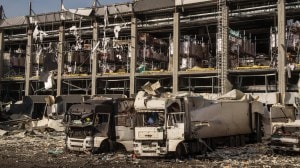No middle ground in Dhaka
In the run-up to elections, the ruling party splits, opposition alliance distrusts proposed caretaker regime and controversy engulfs election commissioners

The decision of 13 sitting members of Parliament to leave the Bangladesh Nationalist Party and join with former president, Badruddoza Chowdhury, in floating the Liberal Democratic Party on the eve of the installation of the caretaker government, adds another dimension to the tug of war in Bangladesh. They have been reportedly joined by large numbers of former BNP legislators and other prominent personalities; they claim that further defections from the BNP are expected soon. Most prominent among the BNP leaders to join the new party is Col (retd) Oli Ahmed.
The development comes in the wake of increasing tensions and speculation about the future of the caretaker government. Following the political crisis in February-March 1996 when the Opposition refused to participate in the elections and subsequent agitations brought the country to a standstill, the newly elected Parliament had enacted an amendment to the Constitution by which Parliament would be dissolved three months before elections and the government handed over to a caretaker government to be headed by the last chief justice. He, in turn, was authorised to run the country and form a cabinet with non-political members of civil society. The new dispensation which was, in fact, a replay of the procedure put in place for the previous election in 1991 after the Ershad government was brought down by street protests not dissimilar to what happened in Kathmandu last April, worked without controversy for the June 1996 elections which brought the Opposition Awami League to power. After losing the 2001 elections, the Awami League brought charges of irregularity against the caretaker government, but this did not seem to agitate too many people.
A crisis brewed two years ago with the decision of the government to raise the retirement age of judges from 65 to 67. This made Justice K.M. Hasan the last chief justice and, hence, qualified to head the caretaker government for the next elections. Though reputed to be an upright gentleman, Justice Hasan had been a member of the Bangladesh Nationalist Party when it was floated by late President Ziaur Rehman in the late ‘70s before he was elevated to the bench. The contention of the 14-party Opposition alliance has been that as a former member of the BNP he cannot be expected to be impartial in the discharge of his duties.
Adding to the political maelstrom have been the controversies surrounding the present chief election commissioner and the appointment of new election commissioners with allegedly partisan views. There have been serious allegations about irregularities in the preparation of voter lists. It also appears that large numbers of the so-called Stranded Pakistanis (who owe fealty to Pakistan but whom that country has not been anxious to repatriate) have been added to the list of voters. The 14-party Opposition alliance has insisted they cannot take part in elections under the stewardship of Justice K.M. Hasan and the incumbent chief election commissioner. Discussions between the ruling BNP and the Awami League were stalled for long due to technicalities. The last flurry of negotiations in the past few weeks have been fruitless.
Dr Badruddzoha Chowdhury was one of the earliest colleagues of late President Zia and the first secretary general of the Bangladesh Nationalist Party. He was chosen to be president of Bangladesh when the BNP returned to power in 2001. Within a few months, however, he was obliged to resign for allegedly not showing sufficient respect to late President Zia. He subsequently formed his own political party, calling it Bikolpo Dhara, or the Alternative Path. He was brutally assaulted in the streets of Dhaka while leading party workers and earlier this year his house was fire-bombed by unknown miscreants.
Col Oli Ahmed, a former freedom fighter, is the strong man of Chittagong and known for his plain speaking. For some time now he has been vocal in condemning the increasing levels of corruption in the country. At the launch of the Liberal Democratic Party, which subsumed Bikolpo Dhara on October 26, strong words were used. Dr Chowdhury said: “From today, a new journey has begun against corruption, injustice, terrorism and failure. The prime minister’s family members have amassed hundreds of crores of taka while corruption and essential prices remained unchecked. Her family has disgraced democracy. We have united today, but the alliance government has been clinically dead long since.” In his remarks, Col Oli said: “A time will come when there will not be any party named BNP. More BNP leaders will join us in 15 days. If the BNP mistreats any of our new party members, we will take an eye for an eye.” There seems little scope for compromise, even if politics is a game of endless accommodation.
The formation of the Liberal Democratic Party would obviously be a matter of grave concern for the BNP. While the members may be sought to be dismissed as dissatisfied elderly leaders not in tune with ground realities or the aspirations of the youth, the charges which the LDP seems to make its plank for the forthcoming elections have been voiced earlier by others. Coming as it does on the eve of formation of the caretaker government, it also perhaps adds to the political uncertainties to which Dhaka has not found the answers in recent weeks and months.
The writer is a former Indian high commissioner to Bangladesh



- 0118 hours ago
- 021 day ago
- 031 day ago
- 0417 hours ago
- 051 day ago




























